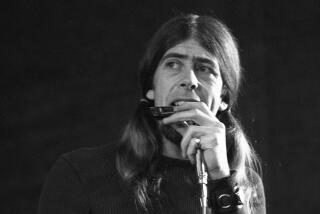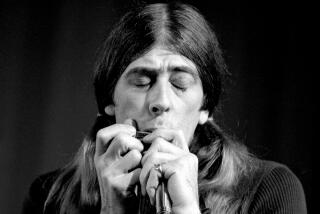John Lee Hooker; Blues Patriarch Helped Rock ‘n’ Roll Take Root
- Share via
Blues superstar John Lee Hooker, whose deep growl and ragged guitar-picking style inspired fans and musicians for generations, died Thursday. He was 83.
Hooker, one of the few remaining links to the classic R&B; and blues sounds that served as the foundation of rock ‘n’ roll, died of natural causes in his sleep early Thursday at his home in Los Altos, south of San Francisco, said his longtime booking agent, Mike Kappus.
The blues patriarch from the Mississippi Delta performed on more than 100 albums in a recording career that spanned more than half a century. Inducted into the Rock and Roll Hall of Fame in 1991, he won four Grammy awards over the years and a Lifetime Achievement Award at last year’s Grammys.
Hooker’s music remained hypnotic and raw, electrifying fans over the beat of his constantly tapping foot. Using an open-tuned guitar allowed him to combine percussive sounds and soulful notes.
He was also a gifted songwriter, creating vital music well into his 70s and 80s while representing one of the last bridges to the pre-rock era of the blues.
“John Lee Hooker was an artist of immeasurable importance in American pop music, someone whose menacing, lustful tales helped take rock ‘n’ roll from the teen celebration of the ‘50s to the adult urgency of the ‘60s,” Robert Hilburn, The Times’ pop music critic, said Thursday night. “Unlike many of the R&B; and blues figures from the ‘50s, who grew stale with time, Hooker maintained his artistic command until the end, adding new levels of sophistication and nuance to his work.”
Hooker’s stylings inspired scores of artists such as the Rolling Stones, Jimi Hendrix, Bonnie Raitt, Eric Clapton, ZZ Top, Canned Heat and George Thorogood.
B.B. King, the only bluesman alive whose stature may exceed Hooker’s, said Thursday night, “I know I’ve lost a good friend, and the world has lost a great talent. He was the best at what he did.”
“There are no superlatives to describe the profound impact John Lee left in our hearts,” said Carlos Santana, with whom Hooker recorded a duet for the Grammy-winning 1989 album “The Healer.” “For musicians and common people, all of us feel enormous gratitude, respect, admiration and love for his spirit. When I was a child he was the first circus I wanted to run away with.”
Born in Clarksdale, Miss., in 1917, Hooker was one of 11 children of a sharecropper who was also a Baptist minister. His musical experiences began in his father’s church, where he sang spirituals. His father, however, frowned on his artistic leanings, and after Hooker’s parents divorced he went to live with his mother and stepfather, a Delta blues guitarist named Will Moore.
Moore taught Hooker the guitar, and the two played together at local dances. At age 14, Hooker ran away to Memphis to perform. A few years later he moved to Cincinnati, where he sang with gospel quartets, and then to Detroit in 1943. He began playing blues clubs and bars around Detroit’s famed Hasting Street, honing a unique style that would later make him an international star. He was finally given a chance to record in 1948.
“Boogie Chillen,” in which he was accompanied only by his electric guitar and his own stomping foot, became a surprise hit for the Modern Records label, and Hooker’s first commercial success.
His distinctive rhythm patterns came to define the style widely known as boogie music. And his songs expanded the limits of the blues’ subject matter, while also tackling sex, violence, guilt, revenge and love.
Like some other postwar blues singers who became embroiled in disagreements with their record companies, Hooker began recording for other labels under an array of pseudonyms, including Birmingham Sam and His Magic Guitar, Johnny Lee, Texas Slim and John Lee Cooker, among others.
In 1955, he began a lengthy association with Chicago’s Vee Jay Records, where he released such R&B; hits as “Boom Boom” and “Dimples.” In the late ‘50s, amid a rising folk music boom, Hooker hit the folk tour circuit and began winning over a new audience, primarily young white fans.
Hooker lived in London for a time, touring Europe with John Mayall’s Bluesbreakers, featuring Clapton and Peter Green on guitars.
New albums began establishing Hooker’s name overseas, and by the early 1960s he was being cited as a major influence on rock acts in the so-called British invasion, including the Rolling Stones.
Even as popular taste veered away from the blues in the 1970s and early ‘80s, Hooker toured constantly and continued writing songs. The 1989 release of his album “The Healer,” which also featured guest acts such as Los Lobos and Raitt, marked yet another Hooker revival and became one of the best-selling blues albums in history.
Raitt, in a statement released by her label, Capitol Records, said she was “deeply saddened by the loss of my dear friend and one of the last and greatest of the original Delta bluesmen. John Lee’s power and influence in the world of rock, R&B;, jazz and blues are a legacy that will never die. Getting to know and work with him these last 30 years has truly been one of the great joys of my life.”
Guitarist John Hammond, a longtime friend who shared concert bills with Hooker and learned of his death moments before going on stage Thursday night at New York’s Underground Village, said, “I feel so honored to have known him. . . . I’m definitely going to announce it and dedicate the set to him.”
While Hooker remained on the road constantly nearly to the end, he enjoyed a quiet suburban life when he could, maintaining a fleet of luxury cars. An avid baseball fan, Hooker used to keep multiple radio receivers tuned to different stations to monitor as many games as possible.
“I never, ever imagined I’d have a career last this long . . . but here I am,” Hooker told The Times in 1998. “If I stopped playing the blues, I’d be miserable. I’ve been given a gift from the good Lord. . . . I think doing what I do is just in my blood.”
A decade earlier, before the release of “The Healer,” Hooker told a Times interviewer that he sometimes wore sunglasses when he played to prevent fans from seeing him cry during his sets.
“You know, I may not be too good at writing things down, but when it comes to creating a song from here”--pointing to his heart--”and here”--then to his head--”nobody can beat me.”
*
Times staff writer Mike Boehm contributed to this story.
More to Read
The biggest entertainment stories
Get our big stories about Hollywood, film, television, music, arts, culture and more right in your inbox as soon as they publish.
You may occasionally receive promotional content from the Los Angeles Times.








